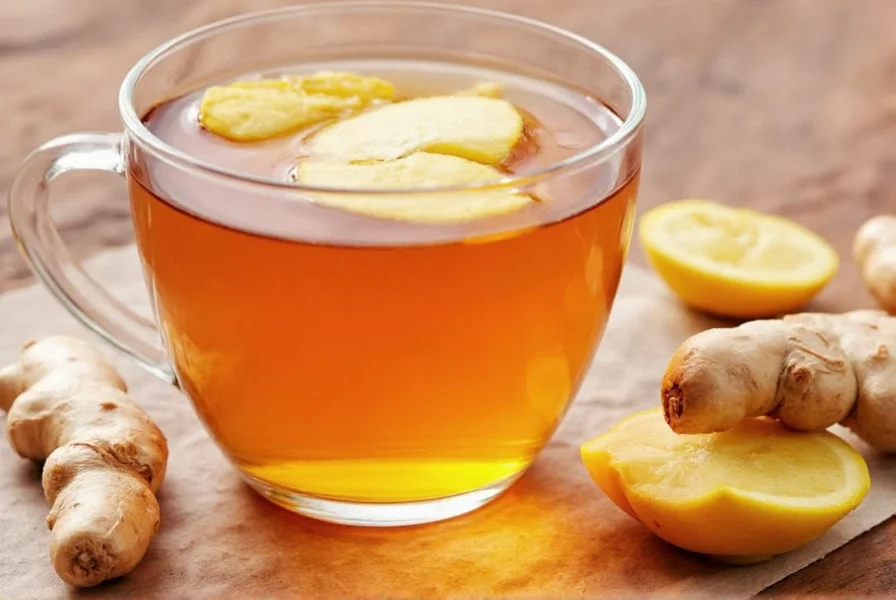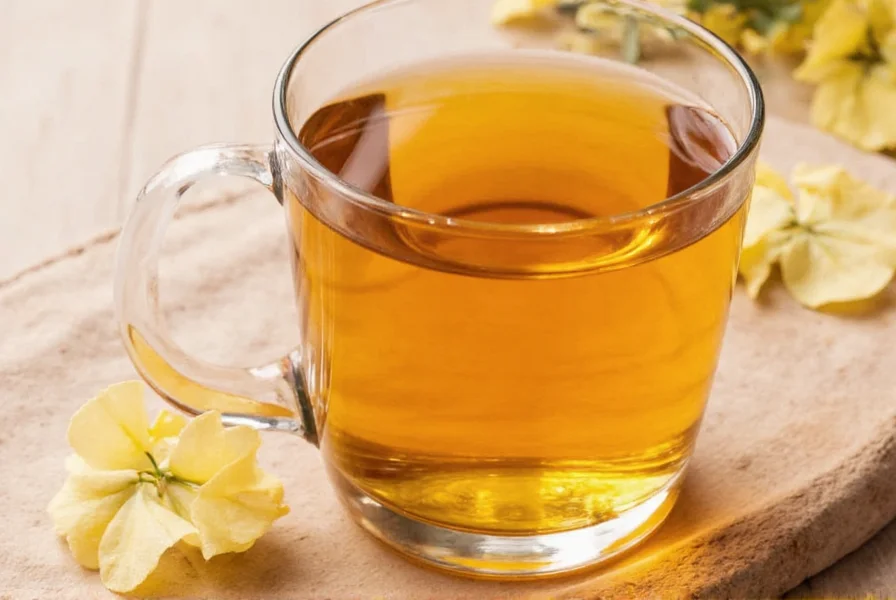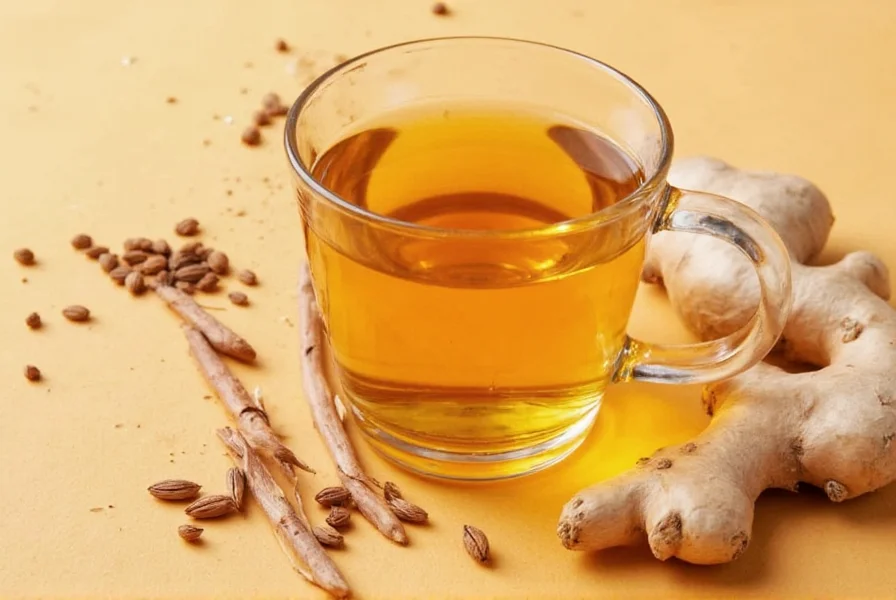For centuries, haldi ginger tea has been a staple in Ayurvedic and traditional Indian medicine practices. This vibrant golden beverage combines two powerful medicinal roots—turmeric (Curcuma longa) and ginger (Zingiber officinale)—to create a synergistic drink with remarkable health properties. Unlike commercial turmeric lattes that often contain excessive sweeteners, authentic haldi ginger tea focuses on the natural therapeutic qualities of these ingredients.
The Science Behind Haldi Ginger Tea Ingredients
Turmeric, known as haldi in Hindi and other South Asian languages, contains curcumin—the primary bioactive compound responsible for its yellow color and most health benefits. Ginger contributes gingerols and shogaols, potent anti-inflammatory compounds. When combined, these ingredients create what researchers call a "phytochemical synergy" where their combined effects exceed what either could achieve alone.
According to a 2022 review published in the Journal of Functional Foods, the combination of curcumin and gingerols demonstrates enhanced anti-inflammatory effects compared to either compound alone. The addition of black pepper—which contains piperine—increases curcumin absorption by up to 2,000%, making it an essential component in traditional preparations.
| Ingredient | Key Compounds | Primary Health Benefits | Scientific Support Level |
|---|---|---|---|
| Turmeric (Haldi) | Curcumin, turmerones | Anti-inflammatory, antioxidant, joint health support | Strong clinical evidence |
| Ginger | Gingerols, shogaols | Digestive aid, nausea relief, anti-inflammatory | Strong clinical evidence |
| Black Pepper | Piperine | Enhances curcumin absorption by 2000% | Well-documented in pharmacokinetic studies |
| Lemon | Vitamin C, citric acid | Antioxidant boost, enhances iron absorption | Established nutritional science |
Traditional Preparation Method for Maximum Benefits
Authentic haldi ginger tea preparation follows specific techniques to maximize bioavailability of active compounds. Unlike simply steeping tea bags, traditional preparation involves:
- Grating fresh turmeric root (1 teaspoon) and ginger root (1 inch piece)
- Simmering in 2 cups of water for 10-15 minutes (not boiling, which degrades compounds)
- Adding a pinch of black pepper (essential for curcumin absorption)
- Straining and adding lemon juice (vitamin C enhances absorption)
- Optional: Small amount of healthy fat (like coconut milk) to further increase curcumin bioavailability

This preparation method differs significantly from commercial "golden milk" products that often contain excessive sweeteners and insufficient active compounds. For therapeutic benefits, researchers recommend consuming haldi ginger tea with approximately 500-1000mg of curcumin daily—which requires using sufficient fresh turmeric root in your preparation.
Evidence-Based Health Benefits
While traditional medicine has long praised haldi ginger tea, modern research provides insight into its actual mechanisms and effectiveness:
Anti-Inflammatory Effects
A 2023 meta-analysis in Nutrients found that regular consumption of turmeric and ginger together significantly reduced inflammatory markers like CRP (C-reactive protein) and IL-6. This makes haldi ginger tea particularly valuable for individuals with inflammatory conditions such as arthritis. The combination appears more effective than either ingredient alone due to complementary mechanisms of action.
Digestive Health Support
Ginger's ability to accelerate gastric emptying combined with turmeric's gut-protective properties creates a powerful digestive aid. Research published in the World Journal of Gastroenterology demonstrated that this combination effectively reduces symptoms of indigestion and may help protect against gastric ulcers.
Immune Function Modulation
Unlike many "immune-boosting" products that overstimulate the immune system, haldi ginger tea works as an immune modulator. Studies show it helps regulate immune responses, which is particularly valuable during seasonal changes. The antioxidants in both ingredients help protect immune cells from oxidative damage.
When to Drink Haldi Ginger Tea for Optimal Results
Timing matters when consuming haldi ginger tea for specific benefits:
- Morning consumption: Best for immune support and digestive preparation for the day
- 30 minutes before meals: Maximizes digestive benefits, particularly for those with occasional indigestion
- Evening consumption: May support restful sleep due to ginger's muscle-relaxing properties (avoid if sensitive to ginger's mild stimulating effects)
- During seasonal transitions: Regular consumption may help maintain immune balance
For therapeutic purposes, most clinical studies use preparations equivalent to 1-2 cups of properly prepared haldi ginger tea daily. Consistency matters more than quantity—regular daily consumption yields better results than occasional large doses.
Safety Considerations and Potential Interactions
While generally safe for most people, haldi ginger tea may not be appropriate in certain situations:
- Blood thinning medications: Both turmeric and ginger have mild anticoagulant properties
- Gallbladder issues: Turmeric may stimulate bile production, problematic for those with gallstones
- Pregnancy: Moderate consumption is generally safe, but high doses should be avoided
- Surgery preparation: Discontinue at least 2 weeks before scheduled surgery
Unlike many herbal remedies, haldi ginger tea has an excellent safety profile when consumed in culinary amounts. However, therapeutic doses (using larger quantities of fresh roots) should be discussed with a healthcare provider, especially for individuals with medical conditions or taking medications.
Authentic Haldi Ginger Tea Recipe
For maximum health benefits, follow this evidence-based preparation method:

Ingredients
- 2 cups filtered water
- 1 teaspoon freshly grated turmeric root (or ½ teaspoon high-quality turmeric powder)
- 1 inch piece fresh ginger root, grated
- Pinch of freshly ground black pepper (⅛ teaspoon)
- ½ lemon, juiced
- Optional: 1-2 teaspoons raw honey or 2 tablespoons coconut milk for enhanced absorption
Instructions
- Bring water to a gentle simmer (do not boil vigorously)
- Add grated turmeric and ginger
- Simmer covered for 10-15 minutes
- Remove from heat, add black pepper and lemon juice
- Strain and add optional honey or coconut milk
- Consume immediately for maximum benefit
This preparation method optimizes the bioavailability of active compounds while preserving their integrity. For best results, use organic ingredients and fresh roots rather than pre-ground spices when possible.
Conclusion: Integrating Haldi Ginger Tea Into Your Wellness Routine
Haldi ginger tea represents a perfect intersection of traditional wisdom and modern science. When prepared correctly with attention to ingredient quality and preparation methods, it offers genuine health benefits supported by growing scientific evidence. Rather than viewing it as a miracle cure, consider it a valuable component of a holistic approach to wellness—one that has stood the test of time in traditional medicine systems while gaining validation through contemporary research.
What is the difference between haldi ginger tea and regular ginger tea?
Haldi ginger tea specifically combines turmeric (haldi) and ginger, while regular ginger tea contains only ginger. The addition of turmeric provides curcumin, which has distinct anti-inflammatory properties that complement ginger's benefits. Traditional haldi ginger tea also typically includes black pepper to enhance curcumin absorption, which isn't necessary in regular ginger tea.
How often should I drink haldi ginger tea for health benefits?
For general wellness, 1-2 cups daily is sufficient. Research suggests consistent daily consumption provides better results than occasional large doses. If using it for specific therapeutic purposes, consult with a healthcare provider as optimal dosage may vary based on individual health conditions and goals.
Can I use turmeric powder instead of fresh turmeric root?
Yes, you can use high-quality turmeric powder (½ teaspoon), but fresh turmeric root generally contains higher levels of active compounds. If using powder, ensure it's from a reputable source as some commercial powders contain fillers. Always combine with black pepper to enhance absorption, regardless of whether you use fresh root or powder.
When is the best time to drink haldi ginger tea?
Morning consumption supports immune function throughout the day, while drinking 30 minutes before meals maximizes digestive benefits. Some people prefer evening consumption for relaxation, though ginger may be stimulating for sensitive individuals. For specific health goals, timing should align with your objectives—consult a healthcare provider for personalized recommendations.
Are there any side effects of drinking haldi ginger tea daily?
When consumed in culinary amounts (1-2 cups daily), haldi ginger tea is generally safe for most people. Potential side effects at high doses include digestive upset or interactions with blood-thinning medications. Those with gallbladder issues should consult a healthcare provider before regular consumption. Discontinue use before surgery due to potential effects on blood clotting.











 浙公网安备
33010002000092号
浙公网安备
33010002000092号 浙B2-20120091-4
浙B2-20120091-4